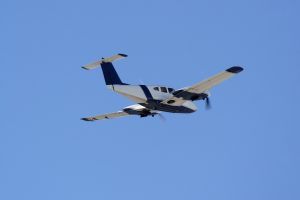What is Required for a Multi-Engine Rating?
When you’re ready to level up in your piloting pursuits, you need to know what is required for a multi-engine rating. Earning this endorsement at Paragon Flight will have you on your way, flying higher, faster, and farther in a twin-engine aircraft. Read on to have clear expectations as you embark on your course.
Eligibility Requirements
 Pilots pursuing a multi-engine rating are typically expected to already be certified as a commercial or private pilot. We largely focus on commercial pilots because the rating is a necessary step for eventually becoming an airline pilot.
Pilots pursuing a multi-engine rating are typically expected to already be certified as a commercial or private pilot. We largely focus on commercial pilots because the rating is a necessary step for eventually becoming an airline pilot.
Additional eligibility requirements for pursuing this endorsement include having a current FAA medical approval and documentation of US citizenship or TSA approval for foreign pilots. These requirements paired with appropriate training are all it takes for pilots to earn the multi-engine endorsement.
Course Requirements
Flying a multi-engine aircraft has different challenges than flying a single-engine plane because of the differences in balance, performance, and system controls. For this reason, much of the multi-engine rating course concentrates on these issues, particularly when one engine fails. Flying a twin-engine craft with one engine can be difficult, so pilots must master this skill at every phase of flight. You should expect to practice every scenario that you could conceivably face in your checkride or a real-life situation.
Paragon Flight’s course is broken down into three components: 5 hours of ground instruction, 11.5 hours of in-flight training, and the 1.5 hour checkride for a total of 13 hours. We also offer a flat rate 15-hour course if you’d like more practice. This comprehensive, intense course will cover every single element you’ll encounter during your culminating checkride.
The checkride will be administered by an FAA authorized evaluator. This multi-engine flight measurement includes a verbal and in-flight component, but it does not include a written knowledge test.
The flight training must include specific elements including the following:
- Performance and limitations of the aircraft
- Aircraft systems
- Performance maneuvers
- Single-engine operations
- Spin procedures
- Emergency procedures
Understanding, applying, and explaining these elements are critical to mastery of multi-engine flight preparation.
Choosing Paragon Flight Is a Smart Move for All Pilots
Starting with our location, Paragon Flight checks every box on what makes a flight institution ideal.
We operate out of Page Field in Fort Myers, FL, where the weather is flying friendly over 300 days of the year. This location is also terrific for pilots who’re traveling with family since fun, sun, and great accommodations are near.
Our student-pilots practice in a Piper PA-44 Seminole, the recognized standard for multi-engine training. The entire fleet here at Paragon Flight is recognized as Technically Advanced and includes Glass Cockpit tech.
In addition to having great facilities and planes, we also offer terrific trainers. Our team of Certified Flight Instructors (CFIs) has an impressive degree of experience and success.
We’re an award-winning flight training institution, being recognized repeatedly by the AOPA (Aircraft Owners and Pilots Association) for our outstanding approach to flight training and the experiences enjoyed by our students/pilots.
Paragon Flight invites pilots of all stripes to come here for training. If you still need answers about what is required for multi-engine rating, call (239)274-3170 for assistance or to schedule your course. With one week and strong motivation to immerse oneself into study, a pilot can be ready to pilot a twin-engine aircraft!
